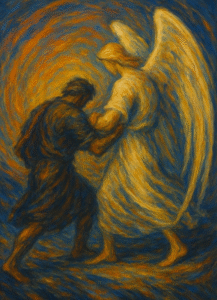Fighting is Not a Mitzvah
We hear about it all the time: fighting, arguing, accusing and judging, all supposedly for the sake of Heaven. The excuse is always the same: “Doesn’t it say in the Torah, ‘You shall reprove your brother and not bear a sin because of him’”? (Leviticus 19:17). “Aren’t we obligated to give Mussar?” This is what all our “caring and sincere rabble-rousers” claim!
Today, the old shteibel coffee room chatter has been technologically upgraded. Bloggers and online whistleblowers can post their opinions and so-called reproofs and, within seconds, their often ignorant and destructive comments make their way around the world, being seen by many thousands of people. The amount of damage caused by this is colossal.
This commandment is perhaps the greatest opportunity for our evil inclination to take advantage of a positive mitzvah and use it as a catalyst for sin. It convinces us, “Didn’t he or she do such and such? Surely they should be severely criticized, chastised and possibly even publicly humiliated!” “It’s my obligation on behalf of God Himself!” This mistake is so grave that otherwise well-intentioned people can completely destroy the lives of so many.
No one is perfect and we all have personal shortcomings. But the Torah commands us to look for the good that we also abundantly possess, and judge our fellow Jew positively. If we are to play the part of God, working on judging others (and ourselves) positively must be our top priority.
Yet what about the times that the Shulchan Arukh (Code of Jewish Law) specifies that we do acknowledge that our fellow Jew has done something wrong? Rabbi Akiva declared in the times of the Talmud, “I doubt there is anyone in this generation who is capable of giving rebuke!” (Erkhin 16b; see Ein Yaakov). Rashi explains that the lesson is to never rebuke someone by embarrassing him publicly.
The Talmud further states that if there is a question of rebuking for the sake of Heaven or abstaining because of false humility, it is better to abstain (ibid.). Rashi explains that the Talmud is saying it is better to refrain from publicly rebuking an individual even if only because one feels a false sense of humility (i.e. that he isn’t on a high enough level) than to rebuke even for the sake of Heaven!
Is this not so much more true so in our times? Would not Rabbi Akiva have made his statement so much more emphatically?
There is a tremendous mitzvah to speak pleasantly to our friend’s heart and encourage him along the way; our parashah commands us to do so. That being said, we must be vigilant to never publicly humiliate anyone, cause embarrassment or, God forbid, resort to fighting, arguments and accusations. Anyone – even rabbis – who stir up arguments and fights are making a terrible mistake and we should stay far away from these elements.
Additionally, Rebbe Nachman once pointed out the example of moving around a foul-smelling object. As long as the object rests in its place, its smell is more or less minimized. However, as soon as one moves the object around, the smell intensifies tremendously. We must be very careful when dealing with our own shortcomings and those of others. Often our main ability is to see the good in others and concentrate on valuing it and judging them positively by it. In this way, we can influence them positively while steering clear of further damage.
The Torah has commanded us to observe the 613 mitzvot. These 613 do not include ANY mitzvah of fighting. May we begin to work on properly keeping these 613 and not on adding any of our own creations.
Based on Likutey Halakhot, Yayin Nesach 4
- 0 comment






















